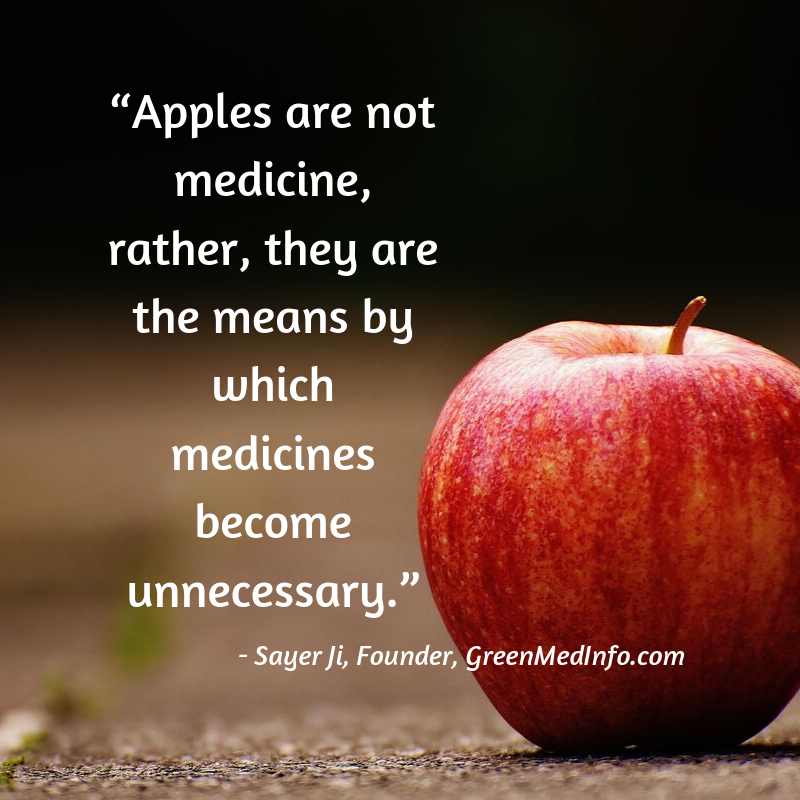I love apples. They are my favorite go-to snack for long bike rides and hikes. They are compact, hydrating and hold their shape well (unlike bananas!) At home, I like to pair it with some almond butter or slices of extra sharp cheese and for dessert, I like to bake them with a little grass-fed butter sprinkled with cinnamon. Is your mouth watering yet?
It’s not surprising that October is National Apple Month because apples are plentiful in the fall. It is also the time of year that Jews around the world dip apples in honey for Rosh HaShana to symbolize a sweet new year. Because they are so delicious, it makes perfect sense that they are among the most popular fruits in the world.
You’ve heard the adage “An apple a day keeps the doctor away”. The longer, older version of this adage came from 19th-century Wales claiming “Eat an apple on going to bed, and you’ll keep the doctor from earning his bread”. There must be some truth to these statements – so, what makes them special?
1. Antioxidants
Apples contain antioxidants known to fight off free radical damage and oxidation. (To learn about free radicals and oxidative stress, go here.) This gives them significant healing power and reduces the risk of developing cancer, hypertension, diabetes, heart disease, asthma and protect nerve cells. Apples have many types of antioxidants, but there has been a lot of research about the benefits of quercetin, catechin, phloridzin, and chlorogenic acid. Apples also have the well known antioxidant vitamin C in small amounts which is also important in boosting your immune system against infections and helps collagen formation for beautiful skin.
2. Dietary fiber
Dietary fiber from apples can keep things moving smoothly and regularly through your digestive tract. Plenty of fiber helps in prevention of diarrhea, constipation and other digestive disorders. Because of the high fiber content in apples, the natural sugar in them is release into the bloodstream at a much slower rate, keeping blood sugar levels more stable. In addition, the specific type of fiber found in apples, pectin, is well known for lowering cholesterol levels naturally. It also binds to fatty substances like cholesterol and toxins to promote their elimination.

In a study at Oxford University that compared the effects of eating an apple a day to taking statins (a class of drugs known to lower cholesterol) concluded that apples would be almost as effective at reducing death from heart disease as the drugs. 1

3. B Vitamins
While not a significant source of B vitamins, there is enough of them to make an impact. They are key to having healthy red blood cells and nervous system.
Thiamine (vitamin B1) assists the body in handling stressful situations, helps power up your immune system, and protects nerve cells.
Riboflavin (vitamin B-2) helps the body breakdown food we eat into energy and for the production of red blood cells to get oxygen into our tissues.
Pyridoxine (vitamin B-6) is needed to make substances that process thought, memory and learning as well as hormones that influence mood and sleep. They strengthen the immune system and heart health.
Biotin (vitamin B7) also helps the body break down food we eat into energy. It supports our nervous, digestive and cardiovascular system as well as maintaining healthy hair, nails and skin.
4. Minerals
The calcium, potassium and phosphorus in apples help keep our cells hydrated, assisting nutrients in and out of our cells. Maybe this is why it is one of my favorite snacks to take on long hikes! These same minerals are stored in our bones and contribute to good bone health.
Apples are one of the best natural sources of boron, important for building strong bones and preventing osteoporosis and arthritis. Improved brain function and balanced sex hormones are associated with adequate amounts of boron in our diet. Boron may help with problems with PMS, menopause or infertility.
Should You Buy Organic?
Apples have amazing health benefits, but these fruits find themselves at the top of the Environmental Working Group’s (EWG) “Dirty Dozen” list every year. The EWG uses the government’s Pesticide Data Program report to identify fruits and vegetables with the most pesticide (and the least) residue. Buying organic produce will reduce your exposure to these chemicals. By reducing exposure you’ll reduce your risk to the diseases associated with them, including cancer, infertility, and neurological diseases like Parkinson’s and Alzheimer’s.
For EWG’s 2019 Dirty Dozen, go here: Dirty Dozen
For EWG’s 2019 Clean Fifteen, go here: Clean Fifteen
In addition, organic produce has been shown to have higher levels of nutrients because it is grown in better quality soil. If you buy conventional apples, be sure to wash them before you eat to remove some of the chemicals.
To learn more about the benefits of buying organic foods or compare the nutrient value of some produce between organic and conventional crops, go here.







